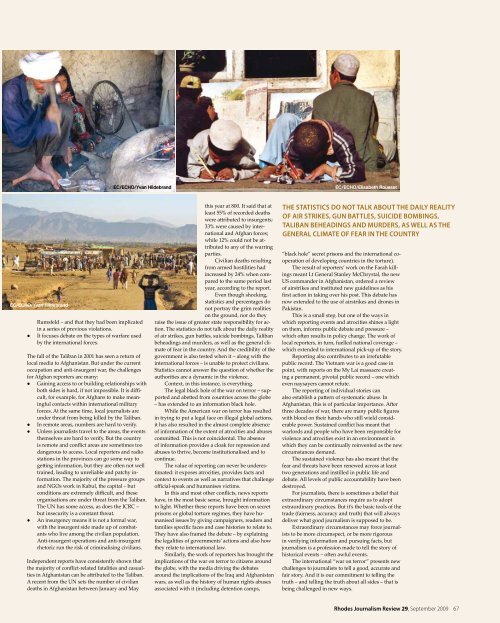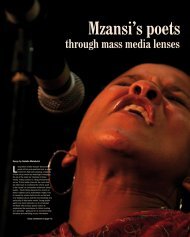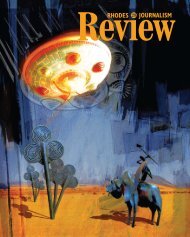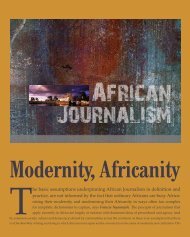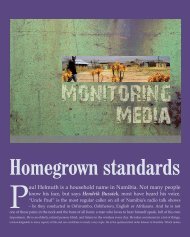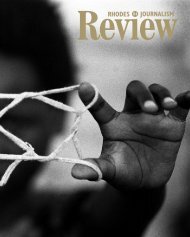Riding on the cup: - Rhodes Journalism Review - Rhodes University
Riding on the cup: - Rhodes Journalism Review - Rhodes University
Riding on the cup: - Rhodes Journalism Review - Rhodes University
Create successful ePaper yourself
Turn your PDF publications into a flip-book with our unique Google optimized e-Paper software.
EC/ECHO/Yvan Hildebrand<br />
EC/ECHO/Yvan Hildebrand<br />
Rumsfeld – and that <strong>the</strong>y had been implicated<br />
in a series of previous violati<strong>on</strong>s.<br />
● It focuses debate <strong>on</strong> <strong>the</strong> types of warfare used<br />
by <strong>the</strong> internati<strong>on</strong>al forces.<br />
The fall of <strong>the</strong> Taliban in 2001 has seen a return of<br />
local media to Afghanistan. But under <strong>the</strong> current<br />
oc<strong>cup</strong>ati<strong>on</strong> and anti-insurgent war, <strong>the</strong> challenges<br />
for Afghan reporters are many:<br />
● Gaining access to or building relati<strong>on</strong>ships with<br />
both sides is hard, if not impossible. It is difficult,<br />
for example, for Afghans to make meaningful<br />
c<strong>on</strong>tacts within internati<strong>on</strong>al military<br />
forces. At <strong>the</strong> same time, local journalists are<br />
under threat from being killed by <strong>the</strong> Taliban.<br />
● In remote areas, numbers are hard to verify.<br />
● Unless journalists travel to <strong>the</strong> areas, <strong>the</strong> events<br />
<strong>the</strong>mselves are hard to verify. But <strong>the</strong> country<br />
is remote and c<strong>on</strong>flict areas are sometimes too<br />
dangerous to access. Local reporters and radio<br />
stati<strong>on</strong>s in <strong>the</strong> provinces can go some way to<br />
getting informati<strong>on</strong>, but <strong>the</strong>y are often not well<br />
trained, leading to unreliable and patchy informati<strong>on</strong>.<br />
The majority of <strong>the</strong> pressure groups<br />
and NGOs work in Kabul, <strong>the</strong> capital – but<br />
c<strong>on</strong>diti<strong>on</strong>s are extremely difficult, and <strong>the</strong>se<br />
organisati<strong>on</strong>s are under threat from <strong>the</strong> Taliban.<br />
The UN has some access, as does <strong>the</strong> ICRC –<br />
but insecurity is a c<strong>on</strong>stant threat.<br />
● An insurgency means it is not a formal war,<br />
with <strong>the</strong> insurgent side made up of combatants<br />
who live am<strong>on</strong>g <strong>the</strong> civilian populati<strong>on</strong>.<br />
Anti-insurgent operati<strong>on</strong>s and anti-insurgent<br />
rhetoric run <strong>the</strong> risk of criminalising civilians.<br />
Independent reports have c<strong>on</strong>sistently shown that<br />
<strong>the</strong> majority of c<strong>on</strong>flict-related fatalities and casualties<br />
in Afghanistan can be attributed to <strong>the</strong> Taliban.<br />
A recent from <strong>the</strong> UN sets <strong>the</strong> number of civilian<br />
deaths in Afghanistan between January and May<br />
this year at 800. It said that at<br />
least 55% of recorded deaths<br />
were attributed to insurgents;<br />
33% were caused by internati<strong>on</strong>al<br />
and Afghan forces;<br />
while 12% could not be attributed<br />
to any of <strong>the</strong> warring<br />
parties.<br />
Civilian deaths resulting<br />
from armed hostilities had<br />
increased by 24% when compared<br />
to <strong>the</strong> same period last<br />
year, according to <strong>the</strong> report.<br />
Even though shocking,<br />
statistics and percentages do<br />
not portray <strong>the</strong> grim realities<br />
<strong>on</strong> <strong>the</strong> ground, nor do <strong>the</strong>y<br />
raise <strong>the</strong> issue of greater state resp<strong>on</strong>sibility for acti<strong>on</strong>.<br />
The statistics do not talk about <strong>the</strong> daily reality<br />
of air strikes, gun battles, suicide bombings, Taliban<br />
beheadings and murders, as well as <strong>the</strong> general climate<br />
of fear in <strong>the</strong> country. And <strong>the</strong> credibility of <strong>the</strong><br />
government is also tested when it – al<strong>on</strong>g with <strong>the</strong><br />
internati<strong>on</strong>al forces – is unable to protect civilians.<br />
Statistics cannot answer <strong>the</strong> questi<strong>on</strong> of whe<strong>the</strong>r <strong>the</strong><br />
authorities are a dynamic in <strong>the</strong> violence.<br />
C<strong>on</strong>text, in this instance, is everything.<br />
The legal black hole of <strong>the</strong> war <strong>on</strong> terror – supported<br />
and abetted from countries across <strong>the</strong> globe<br />
– has extended to an informati<strong>on</strong> black hole.<br />
While <strong>the</strong> American war <strong>on</strong> terror has resulted<br />
in trying to put a legal face <strong>on</strong> illegal global acti<strong>on</strong>s,<br />
it has also resulted in <strong>the</strong> almost complete absence<br />
of informati<strong>on</strong> of <strong>the</strong> extent of atrocities and abuses<br />
committed. This is not coincidental. The absence<br />
of informati<strong>on</strong> provides a cloak for repressi<strong>on</strong> and<br />
abuses to thrive, become instituti<strong>on</strong>alised and to<br />
c<strong>on</strong>tinue.<br />
The value of reporting can never be underestimated:<br />
it exposes atrocities, provides facts and<br />
c<strong>on</strong>text to events as well as narratives that challenge<br />
official-speak and humanises victims.<br />
In this and most o<strong>the</strong>r c<strong>on</strong>flicts, news reports<br />
have, in <strong>the</strong> most basic sense, brought informati<strong>on</strong><br />
to light. Whe<strong>the</strong>r <strong>the</strong>se reports have been <strong>on</strong> secret<br />
pris<strong>on</strong>s or global torture regimes, <strong>the</strong>y have humanised<br />
issues by giving campaigners, readers and<br />
families specific faces and case histories to relate to.<br />
They have also framed <strong>the</strong> debate – by explaining<br />
<strong>the</strong> legalities of governments’ acti<strong>on</strong>s and also how<br />
<strong>the</strong>y relate to internati<strong>on</strong>al law.<br />
Similarly, <strong>the</strong> work of reporters has brought <strong>the</strong><br />
implicati<strong>on</strong>s of <strong>the</strong> war <strong>on</strong> terror to citizens around<br />
<strong>the</strong> globe, with <strong>the</strong> media driving <strong>the</strong> debates<br />
around <strong>the</strong> implicati<strong>on</strong>s of <strong>the</strong> Iraq and Afghanistan<br />
wars, as well as <strong>the</strong> history of human rights abuses<br />
associated with it (including detenti<strong>on</strong> camps,<br />
EC/ECHO/Elisabeth Rousset<br />
THE STATISTICS DO NOT TAlk ABOUT THE DAIly REAlITy<br />
OF AIR STRIkES, gUN BATTlES, SUICIDE BOmBINgS,<br />
TAlIBAN BEHEADINgS AND mURDERS, AS WEll AS THE<br />
gENERAl ClImATE OF FEAR IN THE COUNTRy<br />
“black hole” secret pris<strong>on</strong>s and <strong>the</strong> internati<strong>on</strong>al cooperati<strong>on</strong><br />
of developing countries in <strong>the</strong> torture).<br />
The result of reporters’ work <strong>on</strong> <strong>the</strong> Farah killings<br />
meant Lt General Stanley McChrystal, <strong>the</strong> new<br />
US commander in Afghanistan, ordered a review<br />
of airstrikes and instituted new guidelines as his<br />
first acti<strong>on</strong> in taking over his post. This debate has<br />
now extended to <strong>the</strong> use of airstrikes and dr<strong>on</strong>es in<br />
Pakistan.<br />
This is a small step, but <strong>on</strong>e of <strong>the</strong> ways in<br />
which reporting events and atrocities shines a light<br />
<strong>on</strong> <strong>the</strong>m, informs public debate and pressure –<br />
which often results in policy change. The work of<br />
local reporters, in turn, fuelled nati<strong>on</strong>al coverage –<br />
which extended to internati<strong>on</strong>al pick-up of <strong>the</strong> story.<br />
Reporting also c<strong>on</strong>tributes to an irrefutable<br />
public record. The Vietnam war is a good case in<br />
point, with reports <strong>on</strong> <strong>the</strong> My Lai massacre creating<br />
a permanent, pivotal public record – <strong>on</strong>e which<br />
even naysayers cannot refute.<br />
The reporting of individual stories can<br />
also establish a pattern of systematic abuse. In<br />
Afghanistan, this is of particular importance. After<br />
three decades of war, <strong>the</strong>re are many public figures<br />
with blood <strong>on</strong> <strong>the</strong>ir hands who still wield c<strong>on</strong>siderable<br />
power. Sustained c<strong>on</strong>flict has meant that<br />
warlords and people who have been resp<strong>on</strong>sible for<br />
violence and atrocities exist in an envir<strong>on</strong>ment in<br />
which <strong>the</strong>y can be c<strong>on</strong>tinually reinvented as <strong>the</strong> new<br />
circumstances demand.<br />
The sustained violence has also meant that <strong>the</strong><br />
fear and threats have been renewed across at least<br />
two generati<strong>on</strong>s and instilled in public life and<br />
debate. All levels of public accountability have been<br />
destroyed.<br />
For journalists, <strong>the</strong>re is sometimes a belief that<br />
extraordinary circumstances require us to adopt<br />
extraordinary practices. But it’s <strong>the</strong> basic tools of <strong>the</strong><br />
trade (fairness, accuracy and truth) that will always<br />
deliver what good journalism is supposed to be.<br />
Extraordinary circumstances may force journalists<br />
to be more circumspect, or be more rigorous<br />
in verifying informati<strong>on</strong> and pursuing facts, but<br />
journalism is a professi<strong>on</strong> made to tell <strong>the</strong> story of<br />
historical events – often awful events.<br />
The internati<strong>on</strong>al “war <strong>on</strong> terror” presents new<br />
challenges to journalists to tell a good, accurate and<br />
fair story. And it is our commitment to telling <strong>the</strong><br />
truth – and telling <strong>the</strong> truth about all sides – that is<br />
being challenged in new ways.<br />
<strong>Rhodes</strong> <strong>Journalism</strong> <strong>Review</strong> 29, september 2009 67


